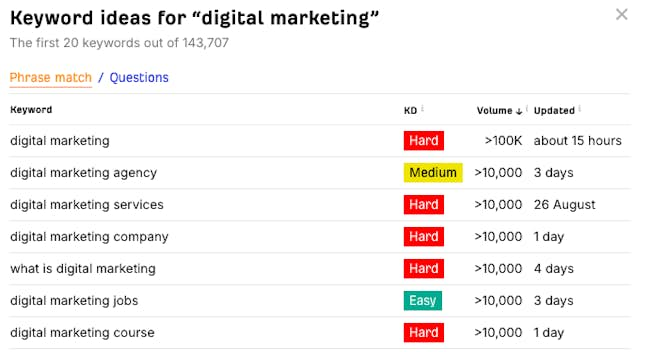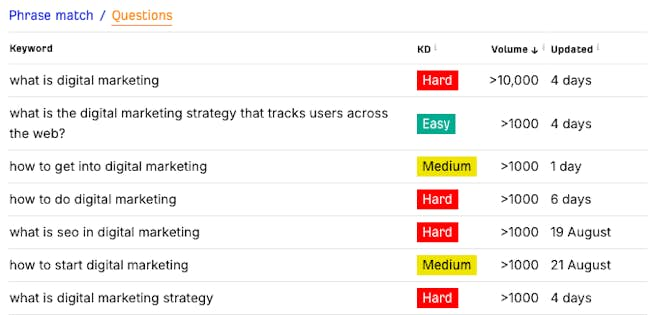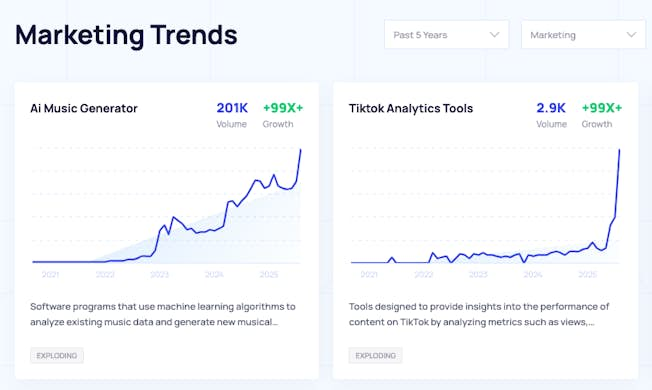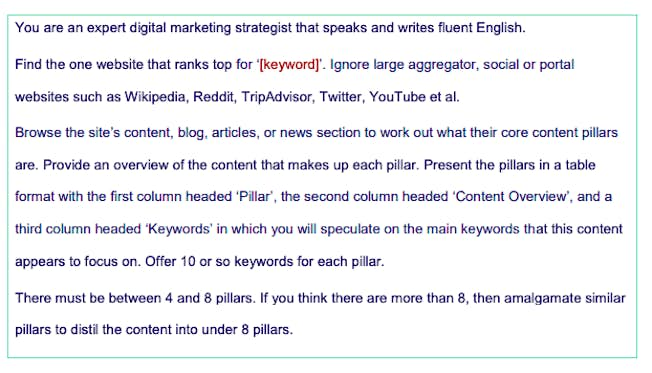Search Engine Optimization (SEO) remains one of the most in-demand digital marketing skills. At its core, SEO skills include the abilities that help marketers improve a website’s visibility, rankings, and traffic from organic search.
But SEO has evolved far beyond keyword research and getting backlinks.
In 2025 and beyond, SEO skills mean blending creativity, strategy, and technical expertise to ensure brands stay visible across increasingly AI-driven search engines. While Artificial Intelligence (AI) has reshaped the industry, a strong foundation in the basics is still critical to deliver the best results in the long run.
However, digital marketers who want to specialize in SEO now need to be all-rounders: They need to master keyword research and link building to technical audits and AI-driven optimization. They need to have both hard skills and soft skills.
Let’s break down the core SEO skills, advanced technical expertise, and the future-ready skills you’ll need to succeed in the ever-evolving search industry.
In this blog, you’ll discover:
SEO is the practice of improving your website so search engines can find, understand, and rank it, and its execution requires several layered skills.
Here are the fundamental search engine optimization skills:
1. Strategic thinking
SEO is not just tactics or the execution of a to-do list. It’s about aligning content with business goals. Strategic thinking helps marketers prioritize where to invest effort: high-value keywords, low-hanging opportunities, or authority-building content.
It allows you to strive for balance throughout your website. You have to decide which pages take priority, which pages to optimize, and how to structure your overall website. You don’t want your potential customers clicking on ten links to get to the page they want to go to, right?
You should start with identifying your SMART goals – this will set you up for strategic success.
2. Competitive research
Are your competitors grabbing the first few spots on the Search Engine Results Page (SERP)? Perhaps they’re even being mentioned by Google’s AI Overviews or generative AI (GenAI) engines like ChatGPT. Conducting a competitive analysis will help you discover what makes their website favored by search engines and AI.
Understanding what competitors rank for and where their backlinks come from helps you spot gaps and opportunities as a marketer. Tools like Ahrefs and Semrush make this easier. Additionally, there are tools such as SparkToro, that detail helpful information such as where online people spend their time, and how they use AI tools.

Once you’ve sufficiently researched your competitors, it’s time to apply some of the same techniques to your website. In SEO, while there is a definite advantage in doing things first, you won’t lag too far behind as long as you do it better.
3. Keyword research
Still the backbone of SEO, keyword research includes identifying entity-based queries, long-tail searches, and trending “people also ask” topics. Effective keyword research will give you ideas on what your target audience would like to see or learn about on your website. It can also aid in your competitive research.
Performing keyword research means knowing how to “distribute” keywords throughout your website strategically. For example, you may plan to target shorter-tailed keywords for product pages, while longer-tailed keywords that are informative in nature or those that warrant a complex discussion are better suited for your blog or resources section.
To help you with keyword research, there is a mountain of tools out there. Some free ones include: Google Trends, Google Keyword Planner, AlsoAsked. There are also tools that offer free, limited access, such as Ahrefs, Moz, and UberSuggest.


4. Content creation
Great content is the fuel that powers SEO. From blog posts and landing pages to case studies and whitepapers, everything you publish should be optimized for both readers and algorithms.
Writing, editing & storytelling
Content that informs, persuades, and connects with your audience performs best. Strong SEO writing balances creativity with data. It uses the right keywords but never at the expense of readability. The goal is to answer user intent while keeping your brand’s voice engaging and trustworthy – especially if you want to appear in genAI results.
The structure and hierarchy of your content is just as important, as it will allow both search engine crawlers and AI crawlers to understand and process your content more easily. This includes on-page structural elements, like lists, FAQ sections, and more.
On-page optimization
On-page elements like titles, descriptions, alt text, and internal linking are vital for helping search engines crawl, index, and understand your content. A page’s title and meta description can make the difference between a potential customer clicking your website or your competitor’s.
Knowing how to write compelling, keyword-rich titles takes skill, practice, and often A/B testing. Even small decisions, like how you structure your URL, can impact performance.
For example, imagine you own a cybersecurity company and want to publish a blog post on “Top Cybersecurity Threats for Companies.” Instead of using a URL extension like /top-cybersecurity-threats-for-companies-2025/ you may want to drop the year so the page can be updated annually. This way, you keep the URL evergreen while refreshing the content each year to maintain relevance beyond 2025.
5. Multimedia skills
Modern SEO is no longer just about text – marketers need to evolve. Multimedia skills, such as creating images, infographics, videos, podcasts, and webinars, help increase engagement, shareability, and visibility across different platforms. Search engines reward content that keeps users engaged, and multimedia can make your pages more dynamic and discoverable.
If you have old but still relevant content, repurposing it and transforming it into another media is a way of extending its life too, such as turning a webinar into smaller video snippets which you can upload to your social media channels.
Pro tip: A great beginner tool to get started is Canva, where you can add your brand design elements, and create just about any piece of content you can imagine
6. Optimization and analytics
SEO is never “set and forget.” Industry standards evolve and so should your content. Blog posts need to be refreshed with updated insights, and outdated pages may need to be consolidated or retired.
That’s where optimization and analytics come in. The most successful marketers and SEO professionals know how to spot which pages need improvement by diving into analytics tools.
Tools you should look into include: Google Analytics and Google Search Console.
7. Trend spotting
SEO and keyword research heavily rely on past data and trends. Even keyword tools give data on past months, but most of them wouldn’t tell you what future keywords can trend or pick up.
Some tools like Google Trends and Exploding Topics help you spot trends or keywords with potential future interest.

Another way to get ahead of trends is to be active on social media platforms to check for up-and-coming topics. Reading the news or publications relevant to your industry also clues you in on issues your readers and potential customers may want to see on your website. Writing about these topics and ranking highly will certainly boost your authority.
What are the advanced technical SEO skills needed for career growth?
Content may attract traffic, but without the right technical foundations, it won’t perform at its full potential. Technical SEO ensures that your content is discoverable, crawlable, fast, and user-friendly. These are all essential signals that search engines use to determine rankings. And having advanced skills will help you grow in your career.
1. Software mastery
Every SEO professional needs to be fluent in core tools such as Google Analytics 4 (GA4) to measure traffic, engagement, and conversions while understanding how users move through your site. Another one is the Google Search Console (GSC) to monitor indexing, fix crawl issues, and analyze which queries drive impressions and clicks.
There are also site auditing tools such as Screaming Frog and Sitebulb to run technical audits, uncover broken links, duplicate content, or slow-loading pages.
Additionally, being able to have access to CMS elements for the website or content you’re working on is hugely beneficial.
Being comfortable with these tools helps you quickly identify technical bottlenecks and fix them before they cost you rankings.
2. Website auditing
A thorough site audit is like a health check for your website. It reveals issues that may be invisible to the user but harmful to search rankings. Key areas to watch include:
- Crawl errors – Pages that search engines can’t reach or index.
- Duplicate content – Multiple pages competing with each other for the same keywords.
- Broken links – Damaged user experience and wasted link equity.
- Redirect chains – Slow page speed and indexing confusion.
The real skill lies not only in identifying these problems but in prioritizing and solving them. You need to know which ones can have a measurable impact: Do you fix a broken sitemap first or eliminate duplicate title tags?
If you have the access needed to work on technical issues like these, you’re already halfway there. But often, marketers may get stuck at this point and will need the web design team to step in. If you’re a marketer with back-end access – even better to get stuck in!
3. Basic coding skills
You don’t need to be a developer or coding whizz, but a working knowledge of HTML, CSS, and a touch of JavaScript goes a long way. Understanding how code structures a webpage helps you troubleshoot common issues like misconfigured canonical tags and improperly nested headings.
Having the ability to speak the same language as developers makes collaboration smoother and ensures SEO recommendations are implemented correctly.
Pro tip: You can start learning by asking the developers on your team questions about their work, and scheduling check-ins to talk through any issues or blockers.
4. User experience (UX) understanding
What good is a website if the user experience is bad? Search engines prioritize user-friendly websites. That’s why Core Web Vitals (Google’s metrics for speed, responsiveness, and visual stability) are ranking factors. Mobile-first indexing also means your site must be fully optimized for smaller screens.
UX-focused technical SEO looks at factors like page loading times, mobile responsiveness, navigation, and internal linking.
Another element of user experience is website accessibility. As a marketer, you may think your job is to just increase traffic – but how is that possible if there are a large number of users out there being excluded?
Ensuring website accessibility allows people with disabilities or access needs to benefit from your website, and ultimately, it will help them feel included. Accessibility elements range from color contrasting, captioning videos, including alt text for images, and more.
5. Link building
Link building in SEO is the practice of earning quality backlinks that signal authority and trust to search engines. Is link building still relevant in the age of AI? Absolutely. But the focus has shifted from sheer volume to relevance, trustworthiness, and context. A link from a respected industry publication or university carries far more weight than dozens of low-quality directory links.
Pro tip: If you’re wondering how you can build links for SEO, start with creating high-value resources that people naturally want to reference.
What SEO soft skills do marketers need?
While technical and analytical skills matter, soft skills often separate good SEOs from great ones.
1. Flexibility & adaptability
SEO changes fast and you have to act fast and make the necessary changes for your website to keep up. This is why it’s important to keep learning and upskilling.
2. Collaboration
Working with content, design, product, and PR teams is critical. If you work on a website for a company that deals with complex terms, digital marketers should also get used to collaborating with different subject matter experts who may be working in a different department.
For example, for a website that deals with clinical terms, an SEO writer may need to interview the clinical teams or doctors.
3. Time management
Prioritize high return on investment (ROI) activities. But make sure to have a roadmap of plans or a content calendar.
For example, auditing a whole website means checking each problem URL after you have crawled the website. If the website hasn’t been audited for the past several years, it means more URLs to look into! This is very time-consuming, so you need to be able to manage your time and prioritize.
4. Emotional intelligence & empathy
Emotional intelligence helps you craft content that connects with real people, not just algorithms. And having empathy for those that could be excluded is also crucial when it comes to prioritizing website accessibility.
What are the future SEO skills?
The SEO landscape has undergone a fundamental transformation. AI-driven platforms such as ChatGPT, Google Gemini, and Perplexity AI are changing how users discover and consume information, while voice assistants like Siri, Alexa, and Google Assistant continue to gain traction.
To remain competitive, digital marketers must adapt by developing a new set of future SEO skills that align with these shifts.
Brand & expertise
Search engines and AI systems prioritize trust, so don’t forget about E-E-A-T principles (Experience, Expertise, Authoritativeness, and Trustworthiness). Build brand authority by consistently publishing expert-led content and positioning your brand as a thought leader. Such efforts will increase the chances of being featured in AI-generated answers.
Structured data & schema markup
AI search engines and voice assistants depend on structured information to deliver clear and accurate results. Implementing schema markup helps search engines interpret your content with precision. Beyond traditional rankings, this increases your visibility in featured snippets, voice answers, and AI-driven summaries.
Using AI for SEO
AI isn’t just reshaping search – it’s also a powerful tool for marketers and SEO professionals.
Skills such as prompt engineering allow you to get better outputs from AI tools. AI-driven platforms can speed up keyword research, competitor analysis, content ideation, and performance reporting. The ChatGPT Prompt Guide will set you up for success when using generative AI for SEO purposes

Of course, it goes without saying that human intervention is still heavily needed at every stage of the process. Verifying the information spouted by these AI engines is still a must. And don’t forget to use AI ethically.
Privacy-first SEO
As third-party cookies disappear and privacy regulations like GDPR and CCPA evolve, marketers need to prioritize ethical data practices. Collecting and using first-party data responsibly while still delivering personalized experiences is now a core SEO skill. Not only does this keep your brand compliant, but it also builds user trust.
Voice SEO
According to Statista, 8.4 billion voice assistants were used in 2024. In the US alone, the number of voice assistant users is expected to reach up to 162.7 billion people. Voice search is here to stay and instead of short keywords, users rely on full questions and conversational queries like, “What’s the best coffee shop near me that’s open now?”
Knowing how to structure your content for voice search is now a must. Things to consider are having natural, conversational language in your content, including local intent and “near me” queries, as well as FAQ-style formats that directly answer questions.
How can you build your SEO master skills?
If you want to develop true SEO master skills, consistent learning is non-negotiable. SEO is not a one-time skill you learn and master. Like most areas in digital marketing, it’s an ever-evolving discipline. Search engines, algorithms, and user behavior change constantly, which means the best SEO professionals are lifelong learners.
The Digital Marketing Institute’s Search Marketing Course gives you practical, hands-on expertise in everything from keyword research and on-page optimization to technical SEO and analytics. It’s designed to help you not just keep up with industry changes, but stay ahead of them.
Beyond coursework, you should consume other types of content, like webinars, podcasts, eBooks, forums, and more. Consuming expert-led resources ensures you’re not just keeping pace with the industry, but leading the way. Follow experts in the search industry to keep informed on the latest, and sign up to newsletters that come straight to your email inbox.
Networking is also a powerful learning tool. Engaging with SEO professionals through LinkedIn groups, online forums, Slack communities, or industry conferences gives you access to real-world case studies and new opportunities. Sometimes, the fastest way to learn is by sharing challenges and solutions with peers who are facing the same SEO roadblocks.
FAQs on SEO skills
Is SEO very difficult?
It can be complex and may seem overwhelming, but with the right training and practice, anyone can learn. Start with the basics, and once those are mastered, move onto the more technical and advanced skills.
Can I learn SEO by myself?
The answer is yes, you can. With free resources, tools, and practical application, many professionals self-learn SEO. But structured certifications accelerate your career path and in a competitive job market, many employers prefer candidates with a certification from a trusted institution.
How to list SEO as a skill?
On your resume or LinkedIn, break it into categories: “Keyword Research, Technical SEO, Content Optimization, Analytics, Link Building.” Back up these skills by describing your experience, how you have applied them, and measurable results.
What is the salary of someone who works with technical SEO?
In 2025, the salary for technical SEO specialists depends on where they are located, as well as their years of expertise. You may check out our free Salary Guide to know how much digital marketers earn per region.
What is the difference between technical SEO and SEO?
Technical SEO focuses on the site’s infrastructure (speed, schema, mobile optimization, crawlability), while SEO broadly covers everything, including content and strategy.


 Based in India, serving clients worldwide
Based in India, serving clients worldwide helloxynova@gmail.com
helloxynova@gmail.com LinkedIn | Instagram | Facebook
LinkedIn | Instagram | Facebook